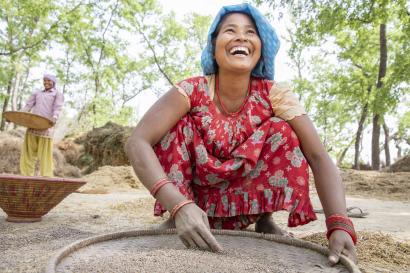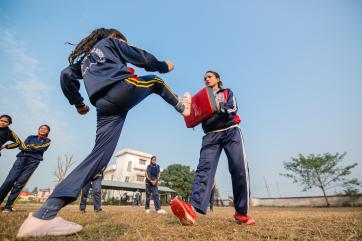Breadcrumb
Nepal

Since 2005, Mercy Corps has been helping communities in Nepal adapt to the impacts of the climate crisis, improving access to food, and increasing opportunities for young people and women. In 2020, we reached over 906,000 people across the country.
The context
Nestled between China and India, Nepal has a population of 29.6 million people. Because of its geography and mountainous landscape, Nepal is prone to natural disasters such as earthquakes, extreme weather conditions, floods, droughts, and landslides, and is still recovering from a large earthquake in 2015. Landslides, which are common during or after an earthquake, account for 25% of Nepal’s natural disasters.
Climate change is disproportionately impacting Nepal compared to its size and contribution of greenhouse gases. Nepal is largely a mountainous country and current indications are that the mountain regions are more vulnerable due to increased warming trends and extreme changes in altitude over small distances. These alarming trends not only make Nepal's major economic sectors, such as agriculture, tourism, and energy more vulnerable, but also endanger the health, safety, and wellbeing of people living there.
Before the COVID‑19 pandemic, one in three people were living in poverty. This number is likely much higher today. Many families rely on remittances — money that is sent home from family members working abroad — to purchase basic necessities, but the pandemic has disrupted this flow of income which makes up over a quarter of Nepal’s entire gross domestic product.
-
33%
-
56%
-
41%
Basic items like food are increasingly expensive and inaccessible in certain regions of Nepal. In the mountain and hill regions, food can be marked up more than twice of what it would cost in other parts of the country due to challenges in reaching remote areas.
Gender and social equality is another pressing issue in Nepal. Women and girls, in particular, are affected by social norms that limit their opportunities for education. With 41% of girls being married before their 18th birthday, early marriage is one of the major challenges. Young girls are more likely to drop out of school compared to their male counterparts, citing the pressures of both household chores and social norms. As a result, women have a significantly lower literacy rate than men—44% compared to 71%.
Our impact
Since 2005, we have been partnering with the most vulnerable and remote communities to provide them with the knowledge, tools, and skills they need to live productive and dignified lives. We promote gender equality across all of our programs while also trying to increase awareness around the issue. Here are our primary focus areas:
- Emergency response
- Disaster risk reduction
- Agriculture and food security
- Youth engagement
- Financial inclusion
Amid the COVID‑19 pandemic, our team has both adapted existing programs so they can continue to work with communities safely while also directly responding to the crisis. Mercy Corps is providing urgent supplies to isolation centers, security and medical personnel, and other vulnerable communities, including masks, face shields, hospital gowns, clean drinking water and hand sanitizer, as well as cash vouchers.

Emergency response
After an emergency, we work quickly to meet the urgent needs of survivors and help people access the resources they need to build back even stronger. After the 2015 earthquakes, Mercy Corps and its partners distributed over 23,000 relief kits and 23,000 cash transfers to earthquake-affected districts, reaching over 114,000 people. We also built latrines to improve sanitation, repaired municipal water systems to ensure access to clean water in the worst-affected communities, and embarked on extensive recovery and rehabilitation activities. Since then, we’ve responded to various other emergencies including flooding, landslides, and the COVID‑19 pandemic.

Disaster risk reduction
We work with communities to identify innovative services and technologies that enable families to better prepare for and respond to inevitable natural disasters, as well as implement preventative measures that will help reduce exposure and potential risks.
Specifically, we facilitate better natural resource management and disaster preparedness committees which provide access to knowledge and resources, and work with communities to develop small-scale projects that mitigate risks. We also create early warning systems in partnership with the Department of Meteorology and Hydrology to inform communities of extreme weather events and provide information, like evacuation routes and gathering points, in case of an emergency.
Agriculture and food security
At the end of 2019, we successfully concluded a project that helped over 80,000 households in the Far Western and Mid-Western region of Nepal cope with stresses and shocks such as seasonal flooding, landslides, low water availability, and disease outbreaks. The project resulted in the near elimination of household hunger. And despite frequently occurring shocks, farmers have been able to double their income and 75,000 families eat healthier diets through increased nutrition knowledge and household gardening practices.
Today, we are continuing to build on these successes. We are meeting the emergency food needs of vulnerable families in the Karnali River Basin while simultaneously building long-term solutions that will improve their access to food and water, and reduce the impacts of natural disaster on their livelihoods and overall well being.

Youth engagement
Mercy Corps prioritizes youth, helping them strengthen their leadership skills, access quality education, build their confidence, and develop their voice. In the event of an emergency like a natural disaster, we also help young people maintain access to learning and psychological support so they don’t fall behind.
Over the last seven years, we supported more than 10,000 adolescent girls to thrive and make the transition towards adulthood. We helped them succeed in school, cultivate life skills, and develop vocational skills so they can access safe work opportunities, while also working with parents and communities to tackle gendered expectations around girls' education. Our work led to a dramatic reduction in the amount of time girls spent doing household chores. We also established a loan mechanism, the Girls Transition Fund, which has so far enabled 459 young women to start up and expand small businesses.


Financial inclusion
We have been working on increasing access to loans and savings for marginalized people in remote areas of Nepal and providing financial knowledge so people, including youth, can plan and invest in their futures.






